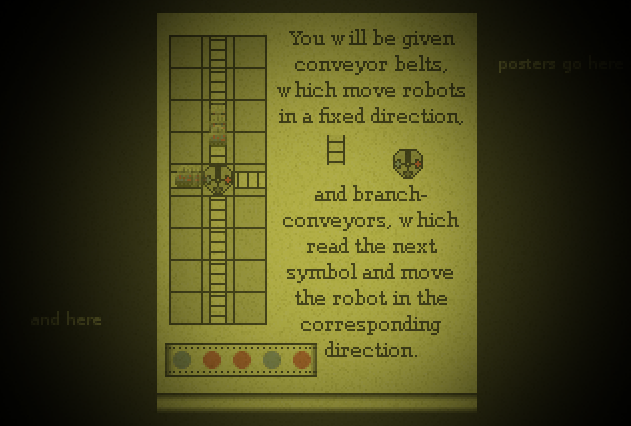Who here likes my “engineering” games? Everyone? Excellent! Because I have something that you may like!
GO PLAY THIS GAME. RIGHT NOW.
And then go vote for it with 5-stars because this fellow is close to winning the weekly prize!
What is this? It’s a flash game called Manufactoid Manufactoria by a Nicholas Feinberg of mysterious origins. And it’s a proper game for engineers, about nothing less than finite state machines (and possibly more complex computational machines, as I haven’t beaten the game yet) in the guise of robot testing equipment. It even has charming flavor text and auto-save. Why are you still reading this? Go play this game!
EDIT: Yup, I see something that looks like a Turing machine. Incredible!


This game is hard! I made it through the first set of branches (where there are 2 levels in parallel), but I’m stuck on all the levels at the point where it branches out to 7.
compsciguy: I don’t know if it will help that much, but consider looking around the internet for information on finite state automata and Turing machines, as lots of these are classic examples. I specifically remember homework questions similar to many of the puzzles in this game from a computational theory course I took in college.
Wow! I did not expect to see this here today. Thank you for the glowing praise!
compsciguy, I would recommend that you work on, ah, “Robo-Children” – the ‘n blue, n red’ level – if you can figure that one out (and it’s fairly simple, once you think of the key thing you need to do), the rest of the levels will be much more solvable. (In the next version, and in the version currently on my website, I’ve re-ordered the levels a bit – swapped ‘Androids’ with ‘Children’, among other things, for pretty much this reason.)
P.S.: The model for the game is actually a somewhat obscure FSM called a queue machine. It has the advantage over a Turing Machine of only having two operations (push/pull, as opposed to read/write/move), while still being Turing-equivalent! Very early versions of the game used a two-stack PDA, but that was pretty much horrendous.
P.P.S.: In my defense, I did not actually know you had a game named Manufactoid when I named Manufactoria. I was rather embarrassed when I came back here to get links for Proper Attribution – but by then, it was too late!
That is a nice (and HARD!) game indeed.
I am stuck at: “Officers!”, “Police!”, “Academics!” and “Robomecha!”.
Love it!!! Played it on Kongregate for the first time, couldn’t get enough! I’m stuck on the second last “bonus” level… pretty hard, don’t think I’m going to come up with the solution anytime soon! As a student computer programmer, I loved and quickly recognized the relation to turing machines (or queue machines). I’ve made a few small games myself and trying to put together a portfolio.
And Zach, I just recently discovered your site about a week ago and have played just about every game here, can’t get enough, keep up the good work guys!
Really good one! I am getting a headache.
[excited]
YOU MADE THIS GAME!?!?!
IT IS AWSOME, AND I NEVER EVEN KNEW YOU MADE IT!!!
[/exited]
No, CyberKing, Zach did NOT make this game. He is listed in the credits as the major inspiration for the game, but the game was made by somwonw going by “PleasingFungus”. Zach goes by “KrispyKrem” or “TheKrispyKremlin”, depending on characters allowed.
Wow, PleasingFungus… good job. I’d played half your game before I came here to praise zach… only to find out that you’d somehow mind-melded with him and produced such a great game.
Thanks Zach for pointing it out and supporting it! Good Work PleasingFungus!
Nice game! And Finished it!
Loving the game 🙂 Brings me memories of my Comp. Theory/Automata classes 😀
To Zach:
This is not about manufactoria (though it is a good game) but PLEASE NO MORE WINDOWS ONLY GAMES!!!!!!!!!!!!!!!!!! Your games look SOOOOOOO good but I cant play 99.9999999999999999999999999% of them.
P.S. –
Please post Mac compatible versions of the following:
ruckingenur (and co.)
Manufactoid
Infinitron
^.^ KrahkaMaster measures his games in brontobytes (10^-27)
Very nice game. I have never had to consider operations like “add these two binary numbers” in terms of Turing Machines before, and I find it fun, if very frustrating.
Wonder whether I can design a game like this one but based on a cyclic tag system?